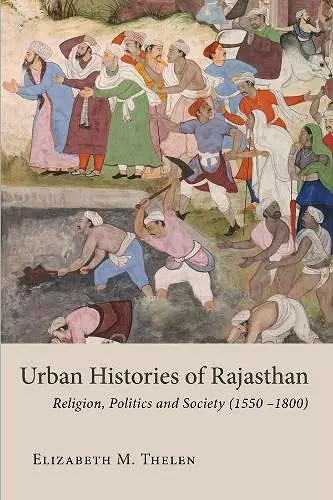Urban Histories of Rajasthan
Religion, Politics and Society (1550 –1800)
Format:Hardback
Publisher:GINGKO
Published:9th May '22
Should be back in stock very soon

Descriptions in literature of premodern Indian cities have included a diversity of peoples found in the streets and markets, evoking a sense of wealth and abundance, and connection to regional and global networks of trade and production. But they also raise questions on how the residents lived together and negotiated their differences: which differences mattered, when and to whom? How did state actions and policies affect urban society and the lives of various communities? How and why did conflict occur in urban spaces? In considering these questions, this book explores the histories of urban communities in the three cities of Ajmer, Nagaur and Pushkar in Rajasthan, between the sixteenth and eighteenth centuries. The focus of this study is on everyday life and contextualising religious practices and conflicts by considering patterns of patronage and looking at conflict more broadly within society. Various archival documents are examined, from family and institutional records to state registers, and the findings demonstrate the complex and sometimes contradictory ways religion intersected with the political, economic and social realms. Negotiations and shared norms meant that many patronage patterns and processes persisted, albeit in altered forms, and it was the robustness of these structures that contributed to the resilience of urban spaces and society in precolonial Rajasthan.
‘This book is an outstanding contribution to early modern Indian social history. It masterfully interprets ethno-religious encounters through lenses of political economy, uncovering the interplay between kingships, religious institutions, and community politics and governance.’ Milinda Banerjee, Lecturer in Modern History, University of St Andrews; ‘Through comparative readings of Rajasthani and Persian sources, Elizabeth Thelen presents Persianate South Asia via quotidian provincial practice rather than cosmopolitan courtly ideals. By eschewing literary texts in favour of everyday documents – wills and contracts, petitions and grants – she reveals the criteria of conflict between different communities no less than the mechanisms of coexistence that promoted urban stability. This is a subtle yet penetrating reappraisal of major themes in Mughal social history.’ Nile Green, Ibn Khaldun Endowed Chair in World History, UCLA; ‘Thelen mines the bureaucratic archive in the Marwari language to excavate histories of patronage, competition, and conflict on the ground. Her equal felicity with Persian documents, deeds and narratives allows her to build on this history of urban life by highlighting parallel hierarchies of patronage across the Marwari and Persian archives. The result is an extraordinary first book on everyday coexistence and conflict between various urban groups in the early modern era, that are rarely studied together even though they inhabit the same urban environment’. Ramya Sreenivasan, Associate Professor at the Department of History, University of Pennsylvania
ISBN: 9781909942660
Dimensions: unknown
Weight: unknown
260 pages